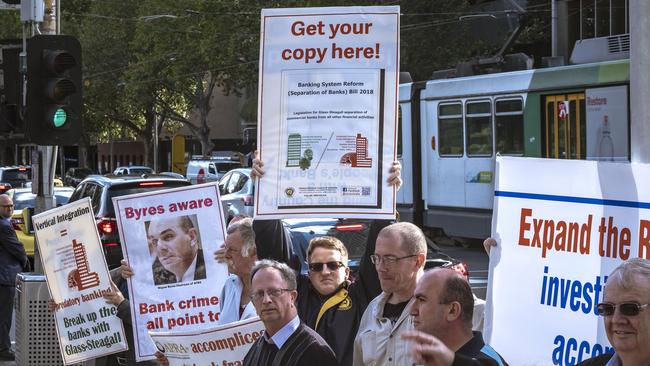David Penberthy: The ‘culture’ of banks has been one big con
THE Royal Commission is proving a bracing experience for those of us who trusted banks, with mounting evidence our robust finance sector has been built off fleecing people, writes David Penberthy.

Rendezview
Don't miss out on the headlines from Rendezview. Followed categories will be added to My News.
THE great management trend of the past couple of decades has been the emergence of the idea of ‘culture’ as the touchstone of business practice.
The theory goes that good companies, like good people, must be guided by a moral compass, a value system that is embraced from on high and percolated down throughout the company.
The cult of culture has been so all-pervasive that many businesses went to the trouble of even abolishing the term ‘human resources’, a mercenary concept which suggested people management was only really about extracting maximum commercial return from your staff.
The word ‘resource’ suggested humans were only valuable in the way that a mine or an expensive piece of equipment was valuable.
In 2018 no-one from HR is from HR any more. They’re all from the Department of Culture or People and Culture. It sounds a lot nicer, even though in reality they’re the same mob who pay you more if you’re good, manage you out if you’re bad, and give you a stern talking to if you’ve been caught photocopying your bum at the Christmas Party.
Being both a natural sceptic and former manager I have always had my doubts about the corporate culture craze.
On the question of culture, Australia’s banks have been not so much drinking the Kool Aid but mainlining it. Their entire marketing and advertising messaging has been crafted around the idea that civil society would somehow grind to a halt without their unyielding generosity and fundamental decency.
The messaging states that all of this generosity and decency has been aimed at the little people — the first homebuyer, the small business owners following their dream, the retiree, the family on the land, the local cricket club desperate for sponsorship.
Set against the evidence we have seen so far at the Royal Commission, it is safe to describe this messaging as crap. The culture claim has been proven to be a con.

Or more accurately, a different kind of culture has been revealed through sustained days of excruciating, jaw-dropping evidence. The culture we have seen is not one of helping others, but helping themselves.
How did it get to this? For many years, bank managers were the most respected members of the community. As a kid growing up, back in the days when banks had things called branches, a close family friend of ours was a bank manager in regional South Australia. He ran a small branch in the southern Adelaide Hills town of Meadows, and was then promoted to head up a bigger branch in the seaside retirees village of Victor Harbor.
Aside from the fact that he had a solid background in finance and accounting, the greatest quality this man brought to his job was his character. He was quite simply the nicest bloke you could wish to meet, a warm-hearted, generous man who knew his customers by name and wanted to do the right thing for them.
Two things seemed to have happened in the world of banking in the space of a generation. Somewhere along the line the guiding principles within banking — or to use another crapulous management term, the key performance indicators of those who run the banks — have changed. The focus shifted from how you serve your customers to how you serve your shareholders. The rights and interests of the customer got shunted to one side.
The second big shift was that as the banks got bigger, they got more detached from the people they used to serve. This detachment has seen them conduct themselves in a manner which the average person now struggles to understand.
However giddy the younger generation and early adopters feel about the rise of timesaving technology, hundreds of thousands of people, especially older people and people in established small businesses, have been seriously disrupted by branch closures.

The detachment of the banks reaches its most obscene when it comes to the question of corporate salaries and bonuses, where it has somehow been decreed in the blithest possible way that multimillion-dollar packages are simply the way of the world these days, and that you have to pay such big dollars to attract the brightest minds in business.
The past couple of weeks has been a chilling and depressing insight into how some of these minds will in reality operate when they are driven by nothing other than a baseline profit motive.
This Royal Commission is proving a bracing experience for those of us who trusted banks and argued against the need for this inquiry as a politically-driven witch hunt.
My view has always been that for all their flaws, Australia should be relieved and grateful that it has a robust and viable banking sector. The problem is that there is now mounting evidence that, in some cases, that robustness and viability has been built off fleecing people. And by fleecing I mean stealing, plain and simple. Stealing from dead people, stealing from confused retirees trying to maximise their nest egg.
This has been a story about culture, for sure. It shows that all this new talk of culture has been a fad and a sham, and that a new culture — or possibly simply an old culture that our family friend represented — must be implemented to restore public trust and customer confidence. Forget Bill Shorten. The greatest enemies of capitalism are those who occupy boardrooms and have forgotten who they serve. This is a corporate nightmare of their own making.
Originally published as David Penberthy: The ‘culture’ of banks has been one big con
